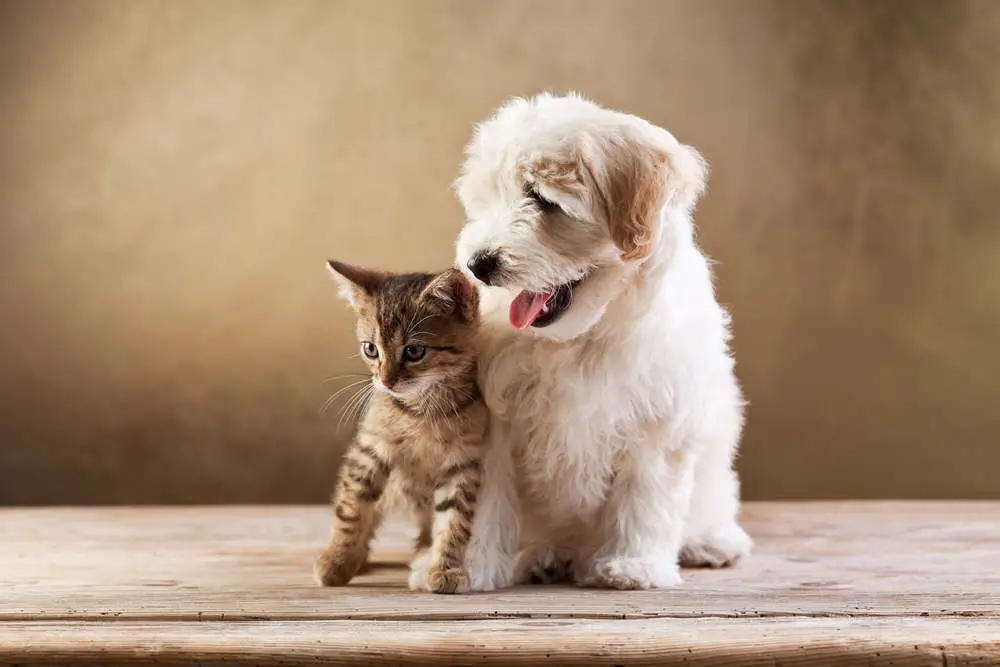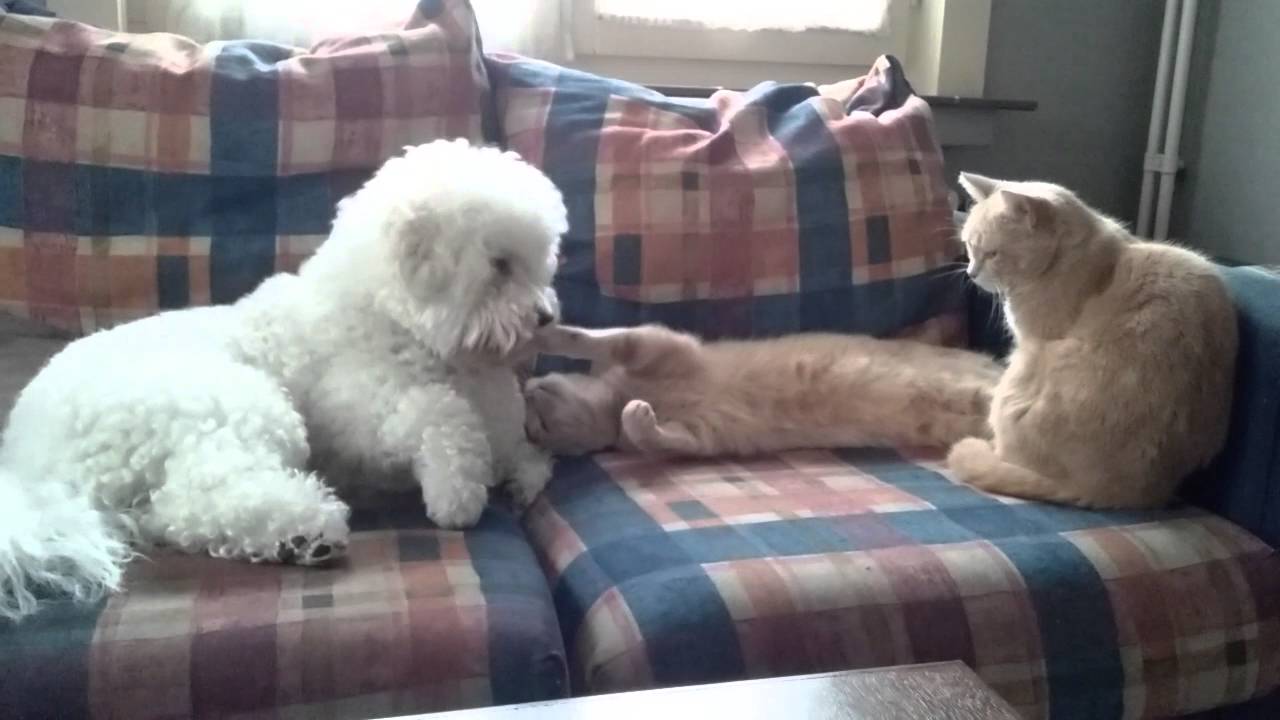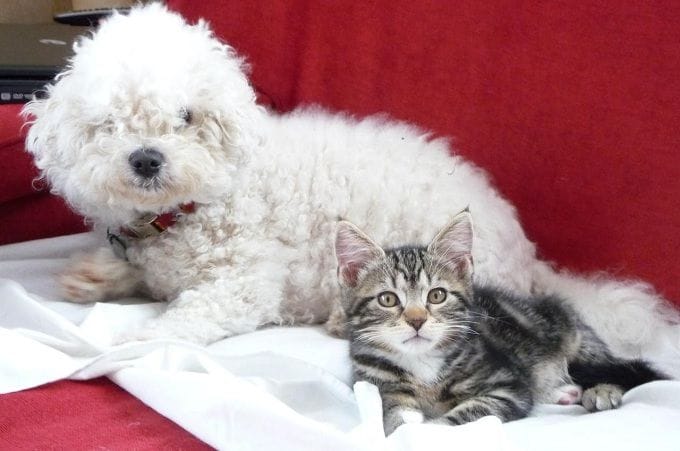Bichon Frises are small, fluffy, and adorable dogs that are known for their playful and affectionate nature. They are a popular choice for families, and many people wonder if they are good with cats. While every dog is different, and there is no guarantee that any dog will get along with a cat, Bichon Frises are generally good with cats.

Bichon Frises are known for their friendly and sociable nature, which makes them good with other animals. They are not aggressive dogs, and they are not likely to harm a cat. However, it is important to remember that every dog is different, and some Bichon Frises may not get along with cats. It is important to introduce the two animals slowly and under close supervision to ensure that they can coexist peacefully.
If you are considering getting a Bichon Frise and you already have a cat, it is important to do your research and make sure that the two animals are compatible. While Bichon Frises are generally good with cats, there are some things to consider, such as the age and temperament of your cat, as well as the personality of the Bichon Frise. With proper introduction and supervision, there is a good chance that your Bichon Frise and cat can become fast friends.

Bichon Frise Temperament
The Bichon Frise is a small breed known for its cheerful and sociable nature. They are a playful and affectionate breed that loves to be around their family. Here, we will explore the Bichon Frise's temperament, including their affectionate nature, playfulness, barking and noise level.
Affectionate Nature
Bichon Frises are known for their affectionate nature. They love to be around their family and thrive on attention and affection. This breed is loyal and will often follow their owners around the house. They are also known for their gentle nature, making them great companions for children and seniors alike.
Playfulness
Bichon Frises are a playful breed and love to play with their owners. They enjoy games of fetch, tug-of-war, and other interactive games. This breed is also known for its energy and can be quite active, making them a great choice for families with children or other pets.
Barking and Noise Level
Bichon Frises are not known for excessive barking. They may bark to alert their owners of strangers or other animals, but they are not a noisy breed. However, like any breed, they may bark if they are bored or anxious.
Understanding Cat Behavior
Cats and Personal Space
Cats are known for their love of personal space. They have an instinct to protect their territory and can become stressed if they feel their space is being invaded. It is important to respect a cat's boundaries and give them the space they need to feel comfortable. This is especially important when introducing a new animal, such as a Bichon Frise, into a cat's home.
When introducing a Bichon Frise to a cat, it is crucial to give the cat time to adjust. The cat should have a safe space where they can retreat if they feel stressed or overwhelmed. The Bichon Frise should also be supervised to ensure they do not invade the cat's personal space.
Cat's Play Behavior
Cats have an instinct to play, and it is important for their physical and mental well-being. However, play behavior can sometimes be mistaken for aggression. It is important to understand a cat's play behavior to ensure they are not stressed or frightened.
Cats often play using their paws and claws, but this does not necessarily mean they are trying to harm their playmate. It is important to monitor play behavior and intervene if it becomes too rough.
When introducing a Bichon Frise to a cat, it is vital to supervise playtime and ensure the cat is comfortable. The Bichon Frise should be trained to play gently and avoid using their teeth or claws.
Cats and Socialization
Cats are social animals and can form strong bonds with their owners and other animals. However, they can also become stressed if they are not socialized properly.
Socialization is important for cats to feel comfortable and confident in their environment. This includes introducing them to new people, animals, and experiences.
When introducing a Bichon Frise to a cat, it is critical to socialize them gradually. The cat should have time to adjust to the new animal and should not be forced to interact if they are not comfortable. The Bichon Frise should also be trained to interact gently and respect the cat's boundaries.
Compatibility of Bichon Frise with Cats
When considering bringing a Bichon Frise into a household with cats, it is necessary to understand the compatibility of these two animals. While every animal is unique, there are some general guidelines to follow to ensure a positive relationship between a Bichon Frise and a cat.
Introducing to Cats
When introducing a Bichon Frise to a cat, it is important to do so slowly and carefully. The first introduction should be done in a neutral space, such as a room that neither animal has claimed as their own. It is recommended to keep both animals on a leash or in a carrier during the initial introduction. This will allow both animals to become familiar with each other without any risk of harm.
Shared Environments
Once both animals have become familiar with each other, they can be introduced into shared environments, such as the living room or kitchen. It is important to supervise these interactions and ensure that both animals are comfortable. If either animal shows signs of stress or aggression, it is best to separate them and try again at a later time.
Companionship Dynamics
Bichon Frises are known for their friendly and playful personalities, which can make them great companions for cats. However, it is important to ensure that the cat is comfortable with the Bichon Frise's playfulness and energy. It is also required to ensure that the Bichon Frise does not become too rough during playtime.
Training for Cohabitation

When introducing a Bichon Frise to a household with cats, it is essential to establish boundaries and rules to ensure a safe and harmonious living environment. Proper training is key to success. Here are some tips for training your Bichon Frise to cohabitate with cats.
Positive Reinforcement
Positive reinforcement is an effective training method for Bichon Frises. It involves rewarding good behavior with treats, praise, and attention. When your Bichon Frise exhibits good behavior around the cat, reward them with a treat or praise. It will encourage your Bichon Frise to continue the good behavior.
Commands and Boundaries
Establishing clear commands and boundaries is essential for a Bichon Frise to cohabitate with cats. Teach your Bichon Frise commands such as "leave it" or "stay" to prevent them from chasing or bothering the cat. Set boundaries for where the cat's litter box and food area are located, and teach your Bichon Frise to respect those areas.
Litter Box and Food Area Respect
Teaching your Bichon Frise to respect the cat's litter box and food area is crucial for a harmonious living environment. Place the litter box and food area in a location that is inaccessible to your Bichon Frise. When your Bichon Frise approaches the area, redirect their attention with a command such as "leave it". Consistency is key in teaching your Bichon Frise to respect the cat's space.
Health and Grooming
Bichon Frise Grooming Needs
Bichon Frises are known for their fluffy, white coats, which require regular grooming to stay healthy and look their best. They have a double coat, with a soft undercoat and a curly, textured topcoat. This means they are prone to matting and tangling, especially if their coat is not brushed regularly.
To keep a Bichon Frise's coat in good condition, it need to be brushed and combed at least once a week. This will help prevent matting and tangling and keep their coat looking fluffy and healthy. Regular bathing is also important, but it's important to use a shampoo that is specifically formulated for dogs, as human shampoos can dry out their skin.
Cats and Grooming
Cats are known for being fastidious groomers, and they spend a significant amount of time each day grooming themselves. This means that they generally don't require much grooming from their owners. However, if you have a long-haired cat, they may need to be brushed regularly to prevent matting and tangling.
Health Considerations for Coexistence
When introducing a Bichon Frise to a cat, it's important to consider any potential health issues that may arise. Bichon Frises are known for being hypoallergenic, which means that they produce less dander than other dog breeds. This can be beneficial for people with allergies, but it's important to note that no dog breed is completely hypoallergenic.
Managing a Multi-Pet Household
When it comes to managing a multi-pet household, there are several factors to consider. These include feeding and nutrition, exercise and playtime, as well as attention and affection distribution. Below are some tips on how to ensure a harmonious environment for both your Bichon Frise and your cat.
Feeding and Nutrition
When it comes to feeding your pets, it is important to ensure that each animal gets the appropriate food and water. Bichon Frises and cats have different dietary needs, so it's important to feed them separate meals. It is also recommended to feed them in separate areas to avoid any potential conflicts.
Exercise and Playtime
Both Bichon Frises and cats require exercise and playtime to stay healthy. It is important to provide each pet with its own toys and play areas to avoid any territorial disputes. Indoor playtime is recommended for cats, while Bichon Frise can benefit from both indoor and outdoor exercise.
Attention and Affection Distribution
It is important to distribute attention and affection equally between your Bichon Frise and your cat. This can be achieved by spending quality time with each pet individually and providing them with equal amounts of attention and affection. It is also important to ensure that each pet has their own space to retreat to when they need some alone time.

Overall, managing a multi-pet household can be challenging but rewarding. By following these tips, you can ensure that both your Bichon Frise and your cat live harmoniously together as part of your family.
Common Concerns and Solutions
Separation Anxiety in Pets
Separation anxiety is a common concern among pet owners. It can manifest in different ways, such as destructive behavior, excessive barking, or even depression. Bichon Frises are known to be prone to separation anxiety, which can make it difficult for them to adjust to being left alone. However, there are solutions to help ease the anxiety. One solution is to gradually increase the amount of time the dog spends alone, starting with short periods and gradually increasing to longer periods. Another solution is to provide the dog with interactive toys or puzzles to keep them occupied and mentally stimulated while alone.
Introducing New Pets
Introducing a new pet into a household with a Bichon Frise can be a stressful experience for both pets. It is important to introduce the pets slowly and carefully to avoid any aggressive behavior. One solution is to introduce the pets in a neutral location, such as a park, where they can get to know each other without feeling territorial. Another solution is to supervise the pets closely during the introduction period and reward positive behavior with treats or praise.
Dealing with Aggression
Aggression can be a concern with any pet, including Bichon Frises. It is important to address aggressive behavior as soon as possible to prevent it from escalating. One solution is to identify the trigger for the aggression and avoid it if possible. Another solution is to seek professional training to help the dog learn appropriate behavior and build confidence. It is important to remain calm and assertive when dealing with aggressive behavior to avoid reinforcing the behavior.
Bichon Frise and Cats: Pros and Cons
Bichon Frise dogs are known for their friendly and non-aggressive nature. They are curious and mischievous, making them great companions for families with children and other pets. However, when it comes to cats, there are some pros and cons to consider.
Pros
One of the benefits of having a Bichon Frise with a cat is that they are generally very friendly towards them. They are not known for being aggressive towards other animals, which means that they will likely get along well with a cat. Additionally, their curious nature means that they will want to investigate the cat, which can lead to a playful and fun relationship between the two.
Cons
While Bichon Frises are generally friendly towards cats, they can also be quite curious and mischievous. This means that they may want to play with the cat, which can lead to some roughhousing. Additionally, their small size means that they could accidentally hurt the cat during play.
Advice for Bichon Frise Owners with Cats
If you have a Bichon Frise and a cat, it is important to supervise their interactions and make sure that they are playing nicely together. You should also make sure that your Bichon Frise is trained to be gentle with the cat and understands that rough play is not acceptable.
Overall, while there are some potential cons to having a Bichon Frise with a cat, they are generally friendly and non-aggressive towards other animals. With proper training and supervision, they can make great companions for cats and other pets.

Conclusion
In conclusion, the relationship between Bichon Frise and cats can be a good one. While it ultimately depends on the individual animals and their personalities, Bichon Frise dogs are generally known for their friendly and affectionate nature, which can make them compatible with cats.
FAQs about Bichon Frise and Cats
- Can Bichon Frise and Cats be friends from the beginning?
- Understanding the gradual process of introduction is crucial for a positive start.
- How do I address jealousy between my Bichon Frise and cat?
- Implementing fair attention distribution and positive reinforcement can help manage jealousy.
- Are there specific breeds of cats that get along better with Bichon Frise?
- Compatibility depends more on individual personalities than specific breeds.
- Can Bichon Frise be trained to coexist with an already-established cat?
- Patience, consistency, and positive reinforcement are key when introducing a new pet.
- What signs indicate a successful relationship between Bichon Frise and cats?
- Playful interactions, mutual grooming, and shared spaces are positive indicators.